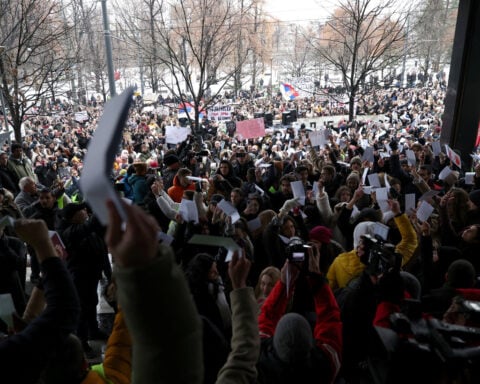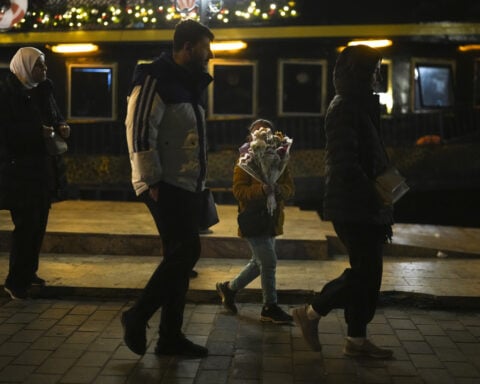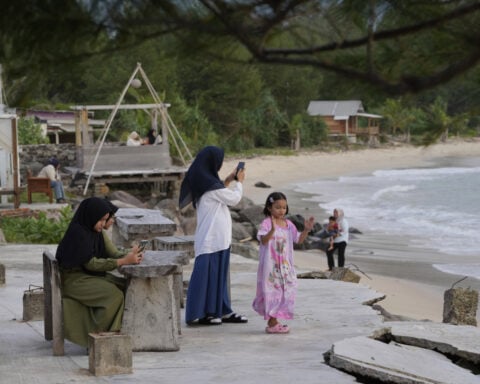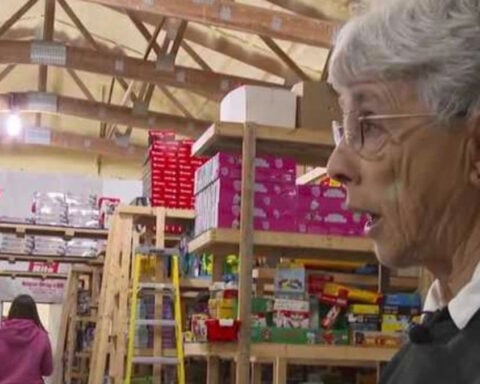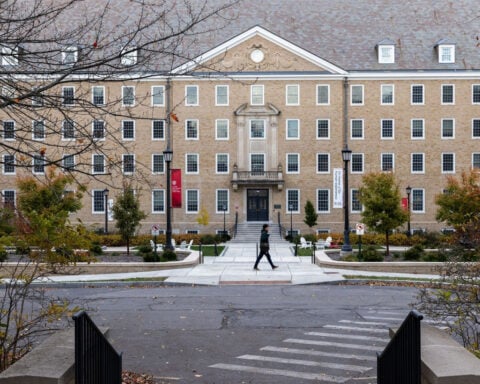John Dewey was one of the most important educational philosophers of the 20th century. His work has been cited in scholarly publications over 400,000 times. Dewey’s writings continue to influence discussions on a variety of subjects, including democratic education, which was the focus of Dewey’s famous 1916 book on the subject. In the following Q&A, Nicholas Tampio, a political science professor and editor of a forthcoming 2024 edition of Dewey’s “Democracy and Education,” explains why Dewey’s work remains relevant to this day.
Why revisit John Dewey’s philosophy on education and democracy now?
I think it is time to revisit Dewey’s philosophy about the value of field trips, classroom experiments, music instruction and children playing together on playgrounds. This is especially true after the pandemic when children spent significantly more time in front of screens rather than having whole body experiences.
Dewey’s philosophy of education was that children “learn by doing.” Dewey argued that children learn from using their entire bodies in meaningful experiences. That is why, in his 1916 text, “Democracy and Education,” Dewey called for schools to be “equipped with laboratories, shops, and gardens.”
Dewey argued that planting seeds, measuring the relationship between Sun, soil, water and plant growth, and then tasting fresh peas made for a seamless transition between childhood curiosity and the scientific way of looking at things. Dewey also encouraged schools to create time for “dramatizations, plays, and games.”
In his 2014 book, “An Education in Politics: The Origin and Evolution of No Child Left Behind,” the political scientist Jesse H. Rhodes shows how business groups and certain civil rights groups advocated federal laws that required states to administer high-stakes tests. This focus on tested subjects means that public school students in places such as Texas have less time for arts education.
What role did Dewey see for public schools in preserving democracy?
For Dewey, modern societies can use schools to impart democratic habits in young people from an early age. He argued that the “intermingling in the school of youth of different races, differing religions, and unlike customs creates for all a new and broader environment.” Dewey was writing as millions of European immigrants were arriving in the United States between 1900 and 1915. Dewey believed that schools could teach immigrants what it means to be a citizen and incorporate their experiences into American culture.
Dewey’s view of the schools remains relevant today. In the 2020-21 school year, more than a third of the country’s children attended schools where 75% of the student body is the same race or ethnicity – hardly the ideal conditions for Dewey’s vision of democracy.
Dewey opposed “racial, color, or other class prejudice.” Segregated schools violate Dewey’s ideal of treating all students as possessing intrinsic worth and dignity. Dewey believed that democracy means “that every human being, independent of the quantity or range of his personal endowment, has the right to equal opportunity with every other person for development of whatever gifts he has.” Democratic schools, for Dewey, empower every child to develop their gifts in ways that benefit the community.
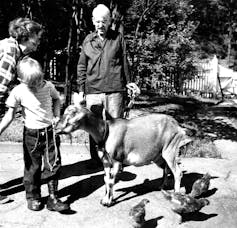
How closely does today’s education system resemble Dewey’s vision for education?
I would argue that the education system resembles the vision of modern testing pioneers like Edward Thorndike more than Dewey’s.
Dewey thought that standardized tests serve a small role in education. He believed that “the child’s own instincts and powers furnish the material and give the starting point for all education.” Dewey maintained that teachers need to use student interest as the fuel to propel students to learn math, reading and the scientific method, and standardized tests serve mainly to help the teacher identify where each student “can receive the most help.” In his lifetime, Dewey opposed proponents of intelligence testing, such as Thorndike.
But the testing proponents seem to be winning. According to a 2023 Education Week survey of teachers, nearly 80% feel moderate or large amounts of pressure to have their students perform well on state-mandated standardized tests. According to one principal, “There’s too much pressure put on these kids for testing, and there’s too much testing.”
Dewey’s vision of education is teachers nurturing each child’s passions and not using tests to rank children. For many teachers, U.S. public schools are far from realizing that vision.
How popular are John Dewey’s views today?
Dewey’s ideas were controversial during his lifetime. They remain so to this day.
In 2023, Richard Corcoran, the president of New College of Florida, criticized “the Dewey school of thought” for training students to become “widget makers.” According to Corcoran, Dewey thought that “if we can teach (people) just enough skills to get on the assembly line and help us with this Industrial Revolution, everything will be great.” Corcoran is right that Dewey thought that schools should teach children about industry, including with hands-on tasks. But Dewey opposed vocational education that slotted children from a young age into a career path.
“I am utterly opposed,” Dewey explained, “to giving the power of social predestination, by means of narrow trade-training, to any group of fallible men no matter how well-intentioned they may be.” Dewey thought that children could learn about history and economics from using machinery in schools. However, he opposed a two-tiered education system that denied working-class children a well-rounded education or that equated human flourishing with making widgets.
Educators and scholars such as Diane Ravitch, Deborah Meier and Yong Zhao cite Dewey and apply his insights to current education debates. Those debates include topics such as the place of standardized testing in schools, the freedom of the classroom teacher and the need for schools to build trust with families and community members.
Zhao, for instance, argues that Dewey outlined a way to address education inequity that does not rely on closing gaps in test scores. Dewey’s idea, according to Zhao, is that all children should have a chance to express and cultivate individuality, learn through experiences and make “the most of the opportunities of present life.”
Dewey believed that “democracy is a way of life.” He also believed schools could teach that lesson to young people by allowing people in the school to have a meaningful say in the aims of education. For many people who read Dewey today, his call for democracy in education still resonates.

Nicholas Tampio does not work for, consult, own shares in or receive funding from any company or organization that would benefit from this article, and has disclosed no relevant affiliations beyond their academic appointment.
Source: The Conversation

 Five facts about electric vehicles in 2024
Five facts about electric vehicles in 2024
 5 elections to watch in 2025
5 elections to watch in 2025
 Transform the daily grind to make life more interesting – a philosopher shares 3 strategies to help you attain the good life
Transform the daily grind to make life more interesting – a philosopher shares 3 strategies to help you attain the good life
 Erling Haaland misses penalty and Man City drops more points after 1-1 draw with Everton
Erling Haaland misses penalty and Man City drops more points after 1-1 draw with Everton
 What if you could rank food by ‘healthiness’ as you shopped? Nutrient profiling systems use algorithms to simplify picking healthy groceries
What if you could rank food by ‘healthiness’ as you shopped? Nutrient profiling systems use algorithms to simplify picking healthy groceries
 Christmas shooting at Phoenix airport leaves 3 people wounded, 1 stabbed
Christmas shooting at Phoenix airport leaves 3 people wounded, 1 stabbed
 Simona Halep withdraws from Australian Open qualifying because of knee and shoulder pain
Simona Halep withdraws from Australian Open qualifying because of knee and shoulder pain
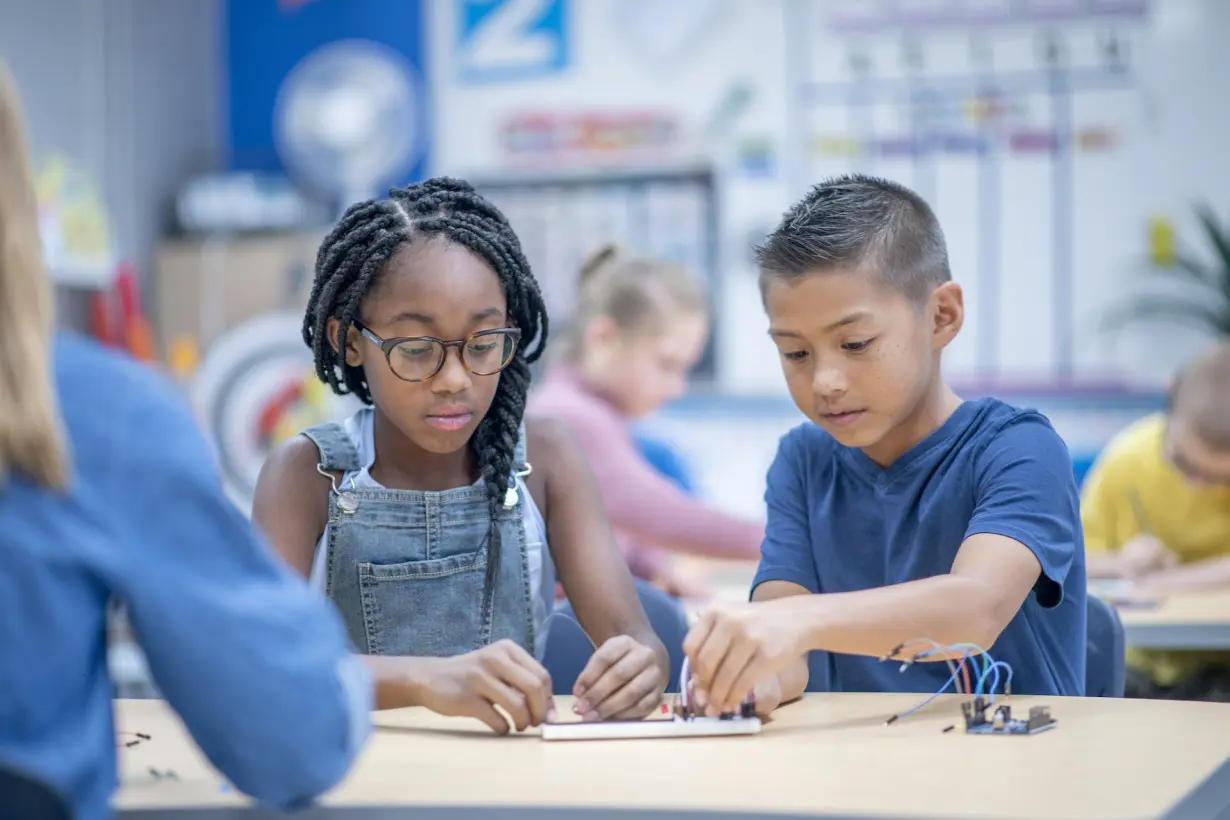 John Dewey was a proponent of active learning.
John Dewey was a proponent of active learning.
